I sat in my Thursday morning Bible study, sharing my confusion and fears with my prayer partner, Shawna.
My husband and I were certain that God had called our family to adoption shortly after our biological daughter, Campbell, was born in 2011. By the time she was 15 months old, we had submitted our dossier to Ethiopia and began our wait for a match. We had been sitting on the waitlist in Ethiopia for two years and had only moved up about 25 spots. We had welcomed another biological child, a son, Declan, into our family just a few months earlier. We had also recently received word from our agency that Ethiopia would only be referring a few children a year for adoption.
In other words, the program was reaching a standstill.
I shared with her that I wondered if we’d misunderstood God and His call; we had hit every roadblock possible in the Ethiopia program, and the setbacks just seemed to keep coming. I was beginning to wonder if our dream of expanding our family through adoption would never come to fruition. As Shawna prayed for our family and for discernment, I cried. The frustration, anxiety, and confusion were overwhelming to me.
Within a few weeks, a phone call came from a social worker at Lifeline, inviting us to consider moving to the China program. The prospect of special needs was daunting to us, and it was difficult to wrap our brains around the significant differences between the China and Ethiopia programs. After much prayer and consideration, my husband, David and I agreed to move from the Ethiopia program and pursue a China adoption on November 2, 2014.
I was so irritated by the prospect of having to complete another dossier and paperwork that it took us over a year to submit our dossier to China. But on December 1, 2015, we logged in and were offered a match with an adorable three year old boy on the same day.
Ultimately, we weren’t able to accept a match with that little guy; his special need was something that our family simply didn’t feel equipped to handle. That decision wasn’t made lightly; we spent three days praying, researching, and consulting with adoption experts before we sadly acknowledged that we would not be the best family to meet his needs.
Roughly one month later, as I was preparing lunch for our two biological children, who were then four years old and 16 months old, my phone rang. My heart leapt as I recognized the phone number. I answered the phone and was greeted by a social worker who shared with David and me that she had a new file for us to look at.
Zhi Hao was just over a year old and was being cared for in our agency’s foster center in Guangdong province. Our social worker went on to say that her special needs were listed as malnutrition and hypoxic-ischemic encephalopathy, a brain injury caused by oxygen deprivation to the brain. My heart dropped and excitement faded.
My husband and I had agreed from the beginning that because we already had two very young children, we couldn’t take on a significant special need. Before I could form a tactful way to tell our social worker I didn’t want to see the file, I heard David request to see it.
Our social worker promised to send the email and a large number of photos for our review. I quickly cleaned up the kids’ lunch mess, put the baby down for his nap, and handed Campbell the iPad with the promise of unlimited screen time so that I could take a look at little Zhi Hao’s file.
I read through it all and was terrified.
She was so malnourished, and her head circumference was so small. I viewed the accompanying photos of Zhi Hao in the orphanage at three months old; she was skin and bones, but she had a spark in her eyes. Her medical evaluation from the foster center showed that at five months, she weighed less than ten pounds. I could tell that she started to grow once she had moved from the orphanage to the foster center, and I was encouraged. Her referral photo showed a sullen little girl in a dirty bib sitting in a rusty baby swing. But she looked healthy, with the sweetest chubby cheeks I’d ever seen.
We conferred with Dr. Staat at the international adoption clinic at Cincinnati Children’s Medical Center about Zhi Hao’s file. Based on videos, growth charts, and reports of the caregivers at the foster center, she felt as though Zhi Hao had great potential and was making great strides in growth and development.
We continued to pray during the two days we had Zhi Hao’s file on hold, and I felt an incredible peace about proceeding with her adoption. When I looked at Zhi Hao’s picture, I knew she was my daughter. We named her Nora Zhihao, and began working quickly to bring her home.
We wouldn’t realize it until much later, but Nora’s date of birth is listed as November 2, 2014… the very same date that we agreed to move to the China program.
By April 8th, 2016, we were on a plane to Guangzhou, China to meet Nora. The following Monday afternoon we walked to the Civil Affairs office with Simon, our guide. To say I was nervous was an understatement, but at the same time I felt at peace knowing that our baby girl would soon be in our arms. We sat with other expectant families on the giant purple velvet couches and watched several families meet their children.
What would our meeting be like? Our agency prepared us well, so we expected many tears and a lot of grief. Soon, Simon said, “Come now! It’s time to meet your daughter!”
We walked to the center of the room and faced the colorful polka-dotted curtain. A group of people walked toward us and handed our sweet Nora Zhihao to me. She was dressed head to toe in varying shades of pink, with adorable bunny shoes on her small feet. As I took her from the assistant director of the orphanage, she smiled. Her smile soon faded into tears as her caregivers walked away and she was left with her new parents, these strangers who looked and sounded completely foreign.
As I held her close and tried to comfort her with shushing and rocking – all of the tricks that worked with my biological children – the only thought it my mind was, “She doesn’t smell like my babies.”
It was at that moment that the weight of becoming a family through adoption truly hit me.
We didn’t have the history that we had with our biological children.
We had to overcome 17 months of lost time.
We didn’t know her likes or dislikes.
We didn’t know her quirks.
We didn’t know anything, except that we were a family and we’d figure it out together.
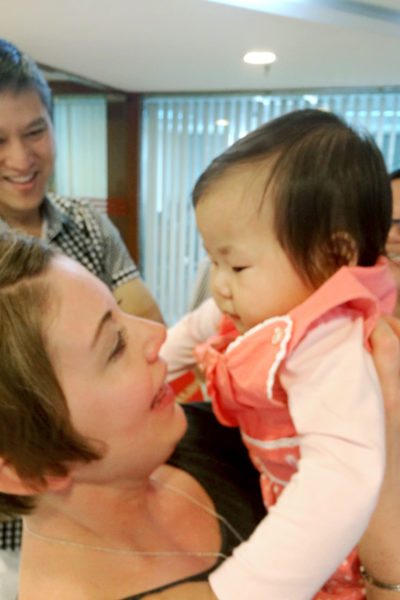
As all of these thoughts swirled through my mind, Nora’s piercing shrieks brought me back to reality. Her glossy black hair was plastered to her head with sweat from her cries and efforts to get out of my arms. As she screamed and arched her body backward in an effort to get away from me, I saw inside her mouth, and my heart sank. I grabbed David and said, “Her mouth. It’s not right. I think she has cleft palate.”
Nora’s file never mentioned cleft palate anywhere. I had never seen a cleft palate before, but I knew that the roof of her mouth (or lack thereof) was very different from that of my other kids. We couldn’t understand how this could have been overlooked. I – a person who had never even seen cleft palate – noticed it within two minutes of having her in my arms. David and I were both shocked… cleft lip/cleft palate was included in the list of special needs we felt willing to accept. But here we were, expecting a child with developmental delays, possible brain damage. Not the surprise of cleft palate.
We had done no research. We didn’t know what kind of treatment or surgeries she might need. We didn’t know to what extent it would affect her ability to eat. We didn’t know anything. The only thing we did know was that Nora Zhihao was our daughter, and bonding with her and establishing strong attachment was priority one.
Nora soon settled down after her foster center ayis brought us her “Lovie”, a white terrycloth hand towel. She slept for most of the ride back to The Garden and soon after settling into our hotel room, she was giving us easy smiles and began to investigate everything.
We were pleased with her development. She seemed to be very new to walking, but got around very well. She made great eye contact, and by the time we finished dinner in the hotel restaurant, she was signing “please” and “thank you.” She loved to eat, and the issue with her palate didn’t seem to slow her down at all.
One of my favorite pictures of Nora is at our first breakfast together in the hotel. She loved the chocolate muffins, and I thought she was so excited about the muffins that she got some in her nose as she ate. I later discovered that the food was coming out of her nose, as a result of her cleft. We spent two weeks in China trying to teach her to drink from a straw – something that was impossible with her cleft. We were clueless.
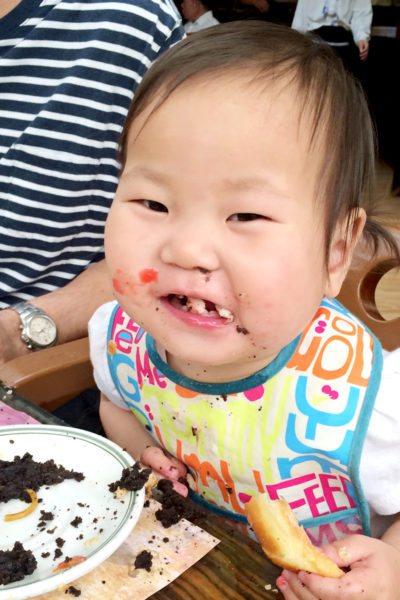
Nora attached to me very quickly and seemed to love the attention and adoration of her new Mama and Baba, even though interaction with Baba had to be on her own terms. She slept well and ate well, and even the dreaded medical appointment didn’t phase her.
As I sat in the exam room with Nora on my lap, the Chinese doctor examined her from head to toe. When he looked into her mouth, he frowned, looked through her paperwork, and looked into her mouth again. When he spoke to me, I could tell that he was reprimanding me. I held up my index finger, in what I hoped was the universal sign for “Hold on just a second,” and I stuck my head out the door and yelled for Simon as loudly as I could. He soon rushed in and spoke with the doctor. “You didn’t put cleft palate on her paperwork!” Simon said to me. “Simon,” I said to him, “I know her mouth isn’t right, but I’m not a doctor. I don’t know that it’s cleft palate. I’m not going to write it on any paperwork if it’s not officially diagnosed. If he is diagnosing her right now, tell him I’ll happily write cleft palate on anything he wants!”
After amending Nora’s paperwork to reflect this newly official diagnosis, we were able to move forward, but David and I were still perplexed by how her palate went undiagnosed for so long. We knew we would likely never have an answer to this question, so we went about the business of becoming a family.
Our time in China with Nora was a dream. She was friendly, outgoing, and lovable, and she was beginning to understand that we were hers and she was ours. When we got back home to Kentucky, she adjusted quite well to life in our noisy, chaotic home with her older sister and barely older brother.
She grieved hard once we got home. We expected the grief and welcomed it as a sign of her ability to attach. She has always welcomed affection from us, her family, and we attribute that to the fact that she was so very well loved at her foster center. She had no language in China, but was picking up signs incredibly quickly. When we arrived home, she couldn’t climb onto the couch and had never seen stairs before. She was soon climbing onto furniture and crawling up steps with ease. She hated the feeling of grass on her feet, and now she loves nothing more than to run barefoot (and often barely clothed) through the yard.
This brave, strong, determined girl wasn’t going to let anything stop her from living her new life freely and wide open.
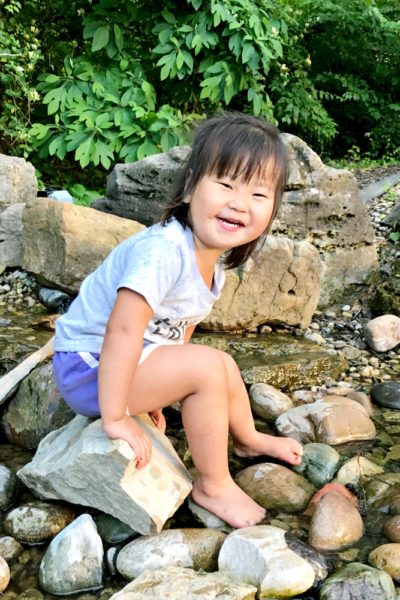
Within a couple of weeks, we met with Dr. Staat for our adoption clinic appointment, and she too was astounded that Nora’s cleft palate was undiagnosed and undocumented in China. She explained to us that cleft palate without any lip involvement is very rare, and is often associated with other genetic syndromes. She explained that her developmental delays could be the result of a genetic syndrome, but they were likely just related to living in institutions. She and her colleagues were pleased overall with Nora’s development, but she still cautioned us about possible unknown factors related to her palate.
Nora has been home with us for 15 months now. She had tubes placed in her ears, which improved her hearing dramatically, and as a result, she started being more vocal. An MRI showed no signs of brain damage at all. She began speech therapy with an amazing therapist shortly after coming home, and she began to speak more clearly. Nora’s palate was repaired in October of 2016, and these days this sweet girl never stops talking and singing!
An eye exam, recommended as a way to rule out possible genetic syndromes, showed perfect vision. Nora Zhihao is as healthy as can be. She amazes us constantly with the things she can do and how quickly she learns. She will likely need speech therapy for some time, and there may be more surgeries in her future. The surprise of Nora’s cleft palate has, in the scheme of things, been a non-issue.
People tell us all the time how lucky Nora is to have been adopted into our family. This precious daughter of ours isn’t lucky. She has lost everything three times in her short life. She has left the land of her birth and her first language. She will likely never have the opportunity to know anything about her biological family or her beginnings. None of that is lucky.
Our family believes that we serve a God who can redeem any situation, and we are quick to say that we are all blessed to have been given one another. There’s nothing special about us as adoptive parents; we simply answered God’s call and have been blessed to have this precious child as a beloved daughter.
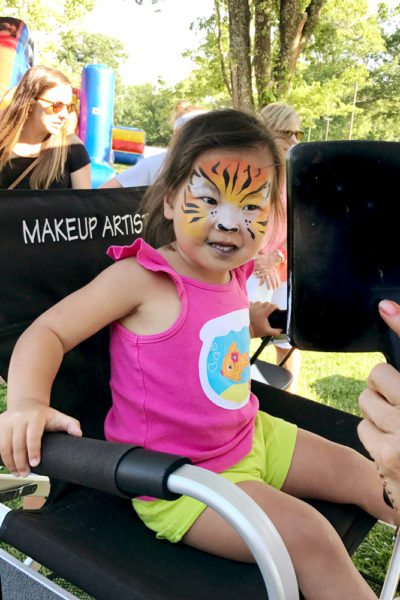
We often hear that it’s good that Nora was adopted so young, so that she wouldn’t remember her time without a family to care for her. Unfortunately, that’s not the case.
She may not have conscious memories of being hungry as an infant, but our sweet girl still constantly fears going hungry.
She may not remember being alone in a hard metal crib in her orphanage, but she still fears being alone or being left behind.
She may not remember a time when there wasn’t enough to go around, but she still fiercely guards anything that is hers and will always, always take the opportunity to grab more.
She may not remember feeling vulnerable, but she can still be aggressive and often misinterprets social cues.
Whatever special need is listed on Nora’s paperwork – malnutrition, hypoxia, cleft palate – the true special need is the trauma associated with abandonment. Working through these issues, these fears, these maladaptive coping mechanisms is going to take a very long time. It can be incredibly frustrating to parent a child who operates out of fear much of the time, and I feel as though I get it wrong at least as often as I get it right.
But we serve a God who can redeem all things. He doesn’t patch things up so that they look just okay. He heals, restores, and makes things new.
When I take stock of the work God has done in Nora’s life, I stand amazed.
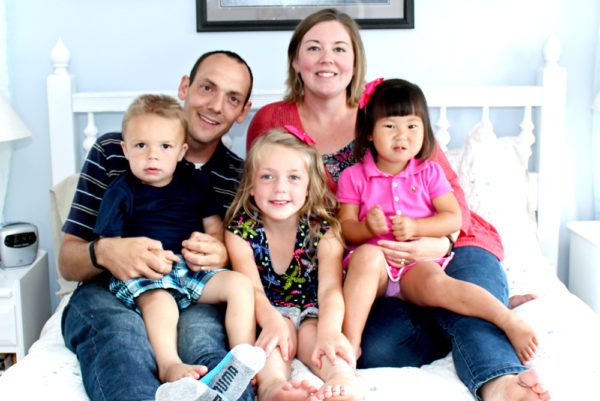
And I am thankful that, while I lean on His strength to guide me through these difficult years of having a young family, He is also in the process of sanctifying me.
Adoption is not an easy road. It can be hard, ugly, and painful. But oh, the beauty and redemption are worth it all.
– guest post by Erin: email || instagram

























Gods grace be with your family!